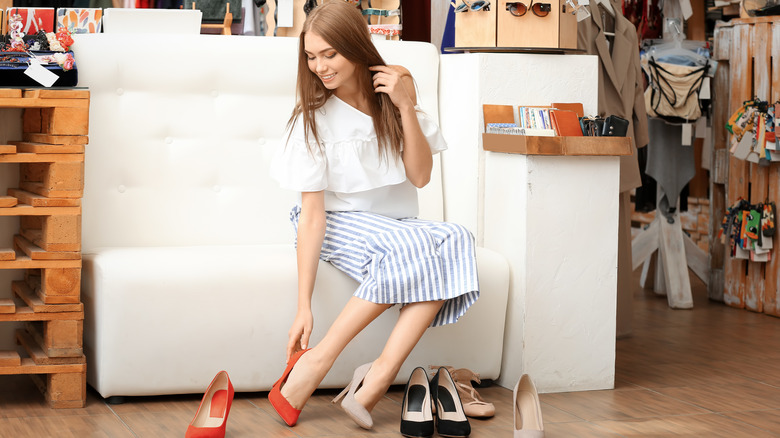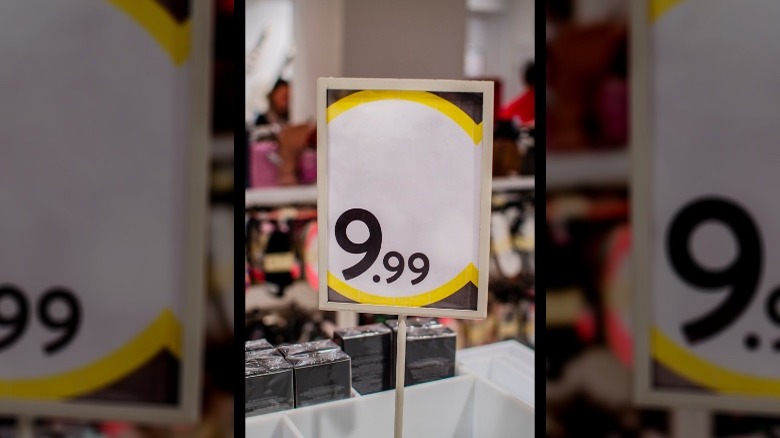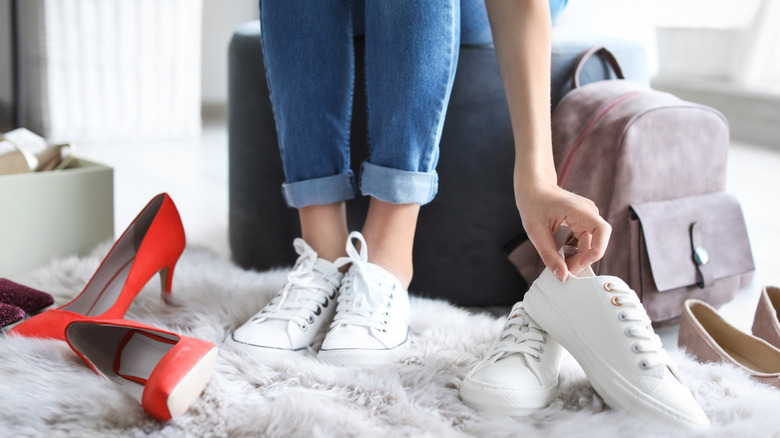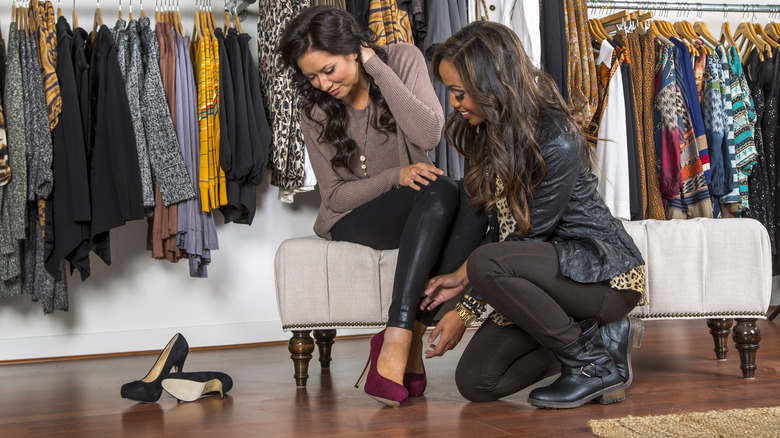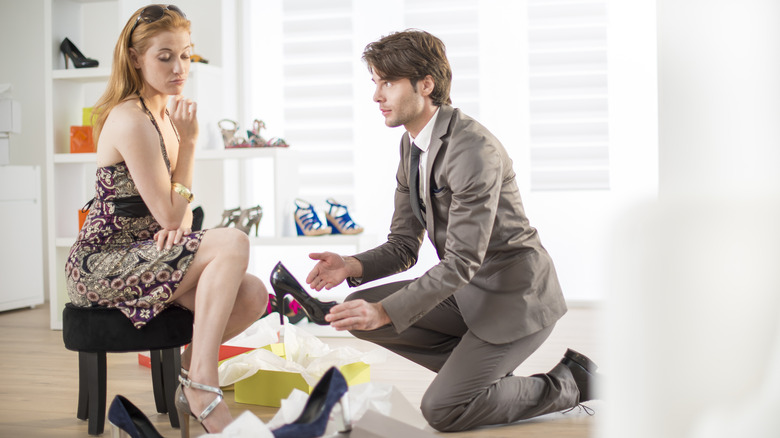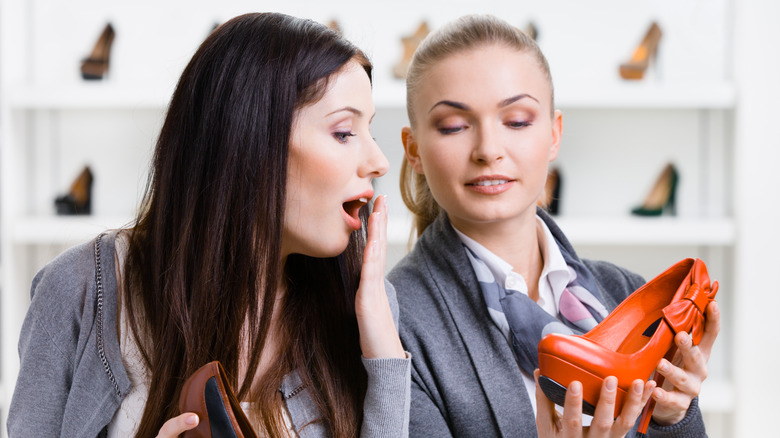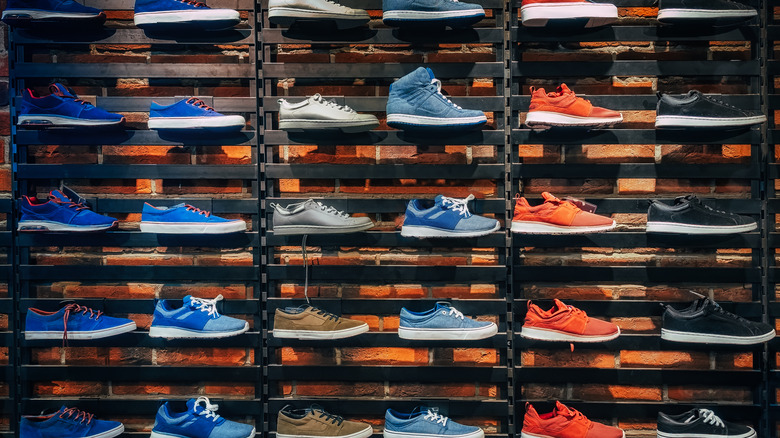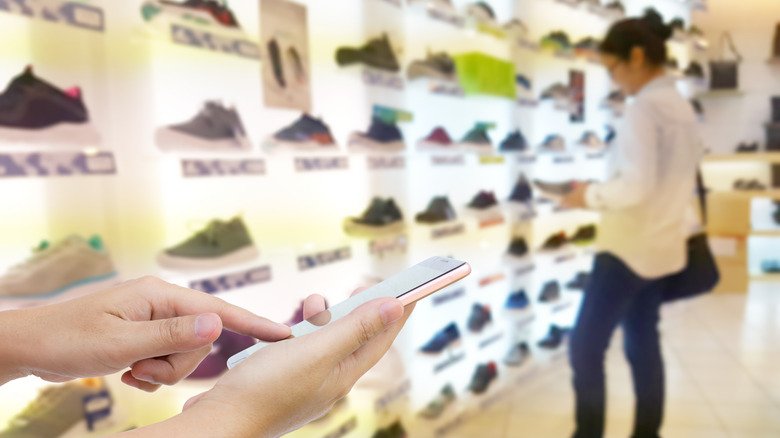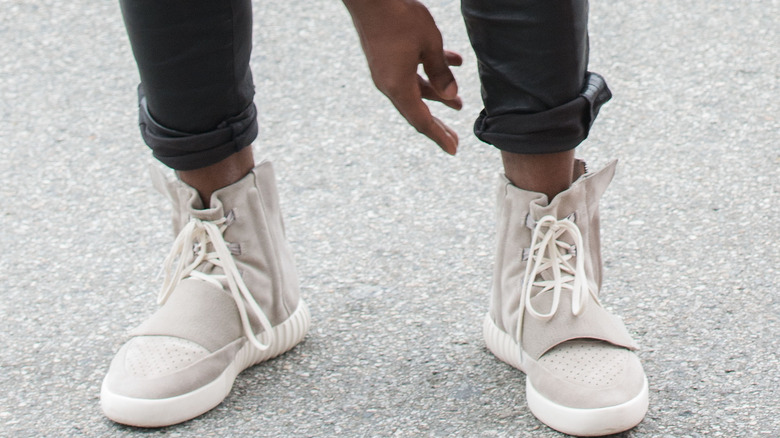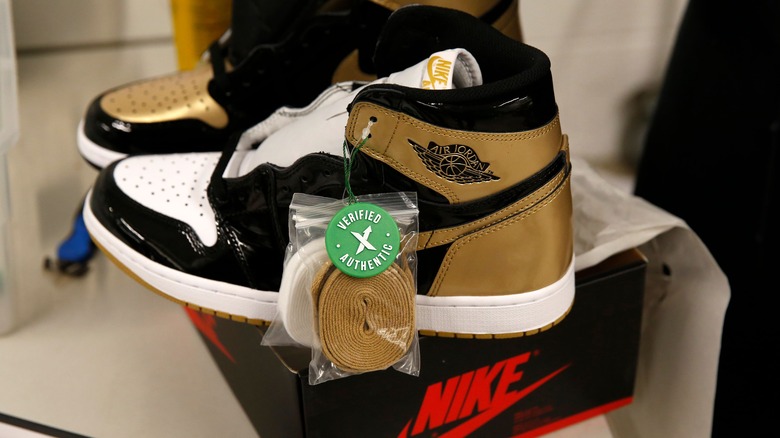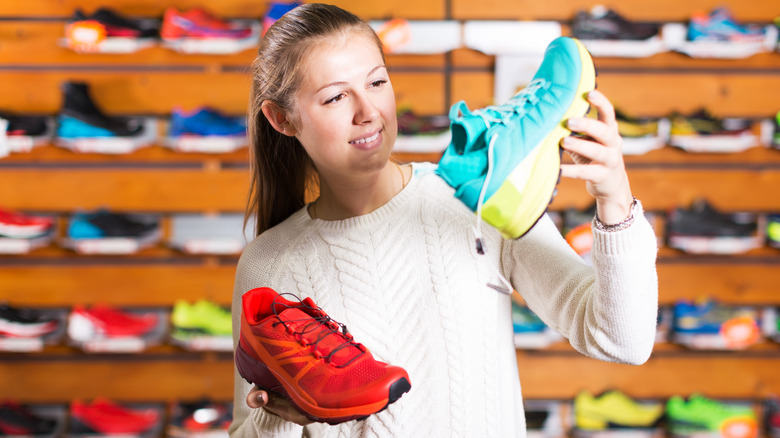Ways Shoe Stores Are Secretly Scamming You
In the United States, footwear is a lucrative business. Contrary to what you may think, it's not just women who are shopping for their solemates. According to the market research firm NPD Group Inc. (via The Boston Globe), men in the U.S. spent over $26 billion on shoes in 2016 — over $2 billion more than they spent in 2014. Although the ladies are still spending more — nearly $30 billion annually — men may just catch up to our splurging habits soon.
No matter which way you slice it though, we're all forking out a whole lot of dough on new kicks each and every year. And, when you use your hard-earned cash to buy something new, especially something as necessary as shoes, you want to get a fair deal. Unfortunately, that's rarely, if ever, possible when it comes to footwear. Here's how shoe stores are secretly scamming you out of hundreds of dollars each year.
The left-digit effect
You may not be familiar with the term "left digit-effect," but you'll certainly know it when you see it. Stores that set prices to end in $0.99 are using this strategy. In an experiment published in the Journal of Consumer Research (via ScienceDaily), the prices of pens were manipulated to $2.00 and $3.99. A staggering 44 percent of participants actually chose the higher-priced item – it appeared that the price difference was marginal due to the left-digit effect. When the prices were changed to $1.99 and $4.00, only 18 percent chose the higher-priced pen.
"Shoppers pay a disproportionate amount of attention to the leftmost digits in prices and... [they] impact whether a product's price is perceived to be relatively affordable or expensive," the researchers explained.
While this sneaky tactic is not unique to any specific subset of retail, you can bet your bottom dollar it's used in sell shoes — both online and in brick-and-mortar stores. The researchers warned, "Consumers should be aware of the subconscious tendency to focus on the leftmost digits of prices and how this tendency might bias their decision-making."
"Four on the floor"
Dillard's Department Stores shoe salesman and YouTube vlogger George Valdez (aka ShoeDogGuru) revealed some special tricks to "sell shoes like a pro." One rule of thumb (or toe, ammiright?), he divulged, is to "always bring out four on the floor." You've probably noticed this tactic without realizing just what was happening. After asking for a different size of a particular shoe, it's common for the salesperson to come back with what you requested... plus several other pairs.
While you may have thought the employee was just being helpful, there's a little more to it than that. The "four on the floor" technique means presenting the customer with four different pairs of shoes — a variety. The reason, the Dillard's salesman explained, is pretty simple: "the more you bring out, the more you sell. The more you show, the more you sell." You can't fault the logic on this one.
This is why shoe sales associates ask you to sit
You're exhausted, but you desperately need a new pair of work shoes. You already know what you want and try to run in and run out without being spotted. Yeah, okay. While we know salespeople are just doing their jobs like anyone else, there are times we wish to shop invisibly. However, for the folks in footwear, letting customers pass by without acknowledgement could mean a missed sale — and often missed commission.
In an excerpt taken from shoe manufacturer and retailer Clarks' retail employee training video, footwear sales associates are directed to greet customers "within ten to 20 seconds" of their arrival and check in after the customer browses. Clarks employees also conduct both "mini" and "full interviews" so they can better assist customers. Afterward comes the seemingly innocuous command: please have a seat.
The training video explains: "By seating them, you gain control of the sale and will have the opportunity to show them several different shoes." Ah-ha. This trick often segues into the "four on the floor" technique.
They tempt you with a more expensive pair
"Four on the floor" is not solely a numbers game. It's true that providing a customer with more options will certainly increase the likelihood of him or her walking away with at least one pair, but shoe sales associates also use the technique in an effort to upsell you.
According to the Clarks' employee training video, the four pair of shoes retrieved for the customer should always include the one that was specifically requested, a pair that's either a half size smaller or larger to find the perfect fit, a "pet" shoe, or one of a different style that fulfills a different need, and lastly, a "comparable pair at a higher price." Ah, we see what you did there.
As demonstrated in the training excerpt, the sales associate also explains the benefits of said higher-priced shoe, making it more attractive to the customer in the hopes of making an extra profitable sale. Sneaky, sneaky!
These are the profit margins
We're all guilty of humble-bragging about the deal we scored on a new pair shoes. But, how much did that coupon or ten-percent-off sale really discount the shoes? Sorry to burst your bubble, but it probably wasn't as awesome as it seemed.
Retail consulting firm Kurt Salmon told Bloomberg said that women's footwear "boasts gross profit margins as high as 50 percent" — that's even higher than women's clothing. The consulting firm says shoes are also far less likely to be marked down than clothing because they're not quite as season-specific. Deborah Rudinsky, a footwear-market analyst for Doneger Group, said shoes also transcend demographics — who doesn't love a good boot, after all? — which makes for fewer price cuts.
In 2012, retailers knew they had to get in on stocking more shoes. Bloomberg reported that Macy's created the world's largest shoe department, with its 63,000-square-foot space and 300,000 shoes, and Barneys New York tacked on an additional 40 percent to its shoe department. We may feel like champions when we score a deal on shoes, but it's obvious who the real winners are.
Exploiting the "premium fashion edge"
Sometimes you walk into the shoe store and find a pair so exceptional that you're tempted to tell the sales associate: "Shut up and take my money!" Sneakerheads know this phenomenon better than anyone. Matt Powell, a retail expert who specializes in sporting goods and athletic shoes, explained in an article for Forbes that 85 percent of athletic shoes are "never worn for their intended purpose." While 15 percent of people may indeed be exercising in their sneakers, an overwhelming amount of people wear them for the same reason we wear just about everything else — as a fashion statement.
"Sneakers are the casual shoe of choice for Americans. Every athletic shoe is a fashion shoe," wrote Powell, "Retailers who can exploit the premium fashion edge will be the most successful." This is the angle that sneaker manufacturers and retailers have been using since 2009 — and it involves no discounts, just "shoes that have more fashion, better make and better materials, and [carry] better price points." And we, as consumers, eat that ish up.
They don't mind if you buy online... with this exception
Brick-and-mortar retail is as good as dead — or is it? Brendan Witcher, principal analyst at Forrester Research, doesn't think so. When speaking with NBC News, he divulged, "There's no retail apocalypse." Instead, he explained that brands are having trouble connecting with their customers.
Regardless, many stores have adopted a "new" way of selling to their customers. Anindya Ghose, a professor at New York University's Stern School of Business, told NBC News that stores wishing to compete with "online behemoths like Amazon" have to shore up their online presence and become well-versed in both internet and mobile commerce.
Commission-based Macy's shoe salesman Nelson Springer related his experience to CNN Money, saying, "I spent a half an hour with [a customer], trying on four pairs of shoes before getting up and saying, 'Thanks, now I know what to get when I buy them online." In an effort to combat customers from going to online competitors, Macy's authorized salespeople to assist customers with online transactions — in store. This way the customer gets the online price, the sales associate receives commission, and Macy's doesn't lose the sale.
The manufacturing of the "hype machine"
When Adidas released its first-ever line of Kanye West's Yeezys, the limited quantity of 9,000 pairs sold in just ten minutes — and that's even with customers only being able to buy them via reservation through the Adidas mobile app, according to Vox. The "hype machine," as Complex so fittingly dubbed it, helps explain why Yeezys sold out every year since Adidas released them in 2015.
If a shoe has a big name, like Kanye West, attached to it or even if the shoe is just thought of as "limited," it's pretty much guaranteed to attract hoards of paying — and overpaying — customers. "Retailers sell out of a limited supply of new releases, some going to collectors (who post on Instagram creating envy, furthering the demand), some going to resellers (who also post on... social media to sell at increased price over retail)," Eric Myers, director of the engineering firm INTEGRIS Group, told Complex. Major footwear companies are most certainly fooling us — and we're not even mad about it.
Woke or just selling sneakers?
In 2017, Time reported that the Oxford English Dictionary updated a word with a new definition: "woke, adjective: Originally: well-informed, up-to-date. Now chiefly: alert to racial or social discrimination and injustice; frequently in stay woke." Of course, even before the dictionary recognized the change, people were indeed striving to "stay woke" — and still are. Major corporations are also getting involved. However, according to an article by Michael Serazio, an assistant Communications professor who teaches media production, advertising, and popular culture, for The Washington Post, this might just be a scam.
In reference to Nike's advertisement featuring Colin Kaepernick, Serazio explained, "Getting us to think we're making a statement by buying Nike is the long con advertising has played, and it has played it well." Whether you agreed with the ad or torched your Air Jordans, the article surmised that Nike got exactly what it wanted. "It's driving a real uptake...," the company's CEO Mark Parker told Yahoo before adding that Nike experienced "record engagement" from the campaign.
Prices are raised without improving quality
While sneakerheads and shoe aficionados everywhere are cool with spending some dough for "premium" footwear, we need to know: are premium shoes really, well, premium?
"Sourcing different leathers and materials that have already been available the entire time doesn't mean the quality has changed," the sneaker reseller Corgishoe explained to Complex, "It's like saying a product is 'new and improved.'" Calling the product better, even if its not, can create an "absolute frenzy." Corgishoe went on to explain that even raising the MSRP (manufacturer's suggested retail price), whether or not warranted, can convince shoppers to buy because they'll "just assume it's premium or an upgrade."
Yes, it's a trap. Footwear corporations have figured out how to keep their costs low and, somehow, we've decided its worth it to pay even more. As the sneaker reseller put it: "The consumer in this market knows the price of everything and the value of nothing." Not anymore, pal, not anymore!
